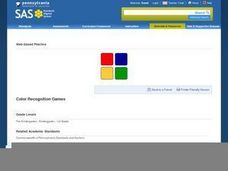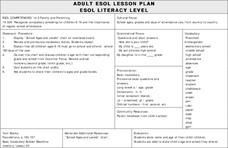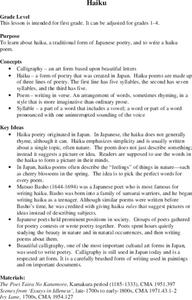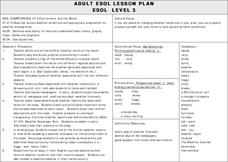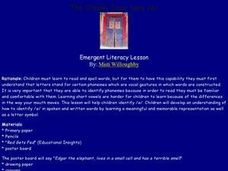Curated OER
Pronunciation Worksheet
In this past tense forms worksheet, learners say and write the past tense forms of the regular verbs given to them. Students complete 80 problems.
Curated OER
Unvoiced and Voiced /th/ Worksheet
In this th word learning exercise, students write the part of speech and voiced or unvoiced choice for words containing th. Students do this for 18 words.
Curated OER
Web-Based Practice
Students explore technology by participating in a word structure activity. In this grammar lesson, students utilize the Writing Center computer software to practice keyboarding while identifying word formations in class. Students...
Curated OER
Picture Match
Young scholars match pictures with words that have specific phonics connotations. In this picture matching lesson plan, students have groups of words with the same phonics sayings.
Pennsylvania Department of Education
Writing With Environmental Print
Young scholars develop literacy skills by exploring street signs, cereal boxes, and billboards. For this writing with environmental print lesson, students build word recognition in every day print. Young scholars decode words and...
Curated OER
Letter Recognition Flash Games for Kids
Young scholars explore the alphabet by completing an on-line letter identification activity. In this phonetics lesson, students utilize the website www.literarycenter.net and listen to word sounds as they identify the spelling of the...
Curated OER
Color Recognition Game
Students study color words. In this math lesson, students complete a variety of activities on the computer in which they identify colors and color words.
Curated OER
Eddie the Elephant
Students need to practice sight words to become proficient readers. So it is very important for children to learn common correspondences. The phoneme for the letter "e" is practiced in this lesson.
Pennsylvania Department of Education
What's My Sound?
Students follow a power point presentation to practice the sounds each letter of the alphabet make. In this 'what's my sound' lesson, students apply word recognition strategies and demonstrate listening and comprehension skills to build...
Curated OER
ADULT ESOL LESSON PLAN--Family and Parenting
Students, after defining and examining an extensive vocabulary list on the board, explore compulsory schooling for children 6-16 and the importance of attending school on a regular basis.
Curated OER
ADULT ESOL LESSON PLAN--Safety and Security
Students, with the help of a vocabulary list of terms involving safety and security procedures, analyze pictures of recreational activities found in magazines/dictionaries and in groups review all the safety and security procedures...
Curated OER
Haiku
Students work collaboratively to create a class Haiku and illustrate the poem individually in this elementary school instructional activity. The instructional activity includes five possible enrichment activities.
Curated OER
Weather Conditions
Students list and name various kinds of weather conditions occurring in their city. Using the newspaper as a resource, students answer questions relating to written weather reports. This instructional activity is intended for students...
Curated OER
The Creaky Door says /e/
Pupils explore the short /e/ sound, and identify the short /e/ in writing. Students read fun sentences from the board which emphasize the short /e/. They stretch out the /e/ sound every time they come to it while reading. They then...
Curated OER
ESOL Personal Information
Students observe examples of personal information and the reading and answering of related questions. They practice listening to personal questions and giving the appropriate response.








